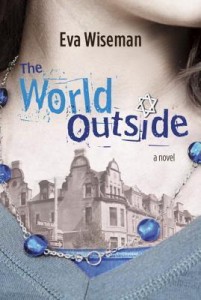 Summary: As seventeen year-old Chanie works on completing her last year of high school, a chance encounter with a non-orthodox Jewish guy while performing Outreach introduces her to the world outside of her tight-knit Hasidic community. Despite being forbidden to hang out with members of the opposite sex alone, Chanie and David start meeting in secret, opening Chanie up to his influence. When David hears her sing, he encourages Chanie to apply to Juilliard to study music instead of becoming a teacher in her community. At odds with her family, Chanie feels the pull of wanting to pursue her dreams, but everything changes when an accidental death of a young Black child caused by a Rabbi’s vehicle sparks a three-day riot as Blacks go after Jews. The appalling events help Chanie decide and pursue her future.
Summary: As seventeen year-old Chanie works on completing her last year of high school, a chance encounter with a non-orthodox Jewish guy while performing Outreach introduces her to the world outside of her tight-knit Hasidic community. Despite being forbidden to hang out with members of the opposite sex alone, Chanie and David start meeting in secret, opening Chanie up to his influence. When David hears her sing, he encourages Chanie to apply to Juilliard to study music instead of becoming a teacher in her community. At odds with her family, Chanie feels the pull of wanting to pursue her dreams, but everything changes when an accidental death of a young Black child caused by a Rabbi’s vehicle sparks a three-day riot as Blacks go after Jews. The appalling events help Chanie decide and pursue her future.
Number of Pages: 232
Age Range: 14-16
Review: Eva Wiseman uses an historical setting with 1991 Brooklyn, New York for background to set up Chanie Altman’s journey in The World Outside. Except I didn’t know Wiseman’s book was a piece of historical fiction until I happened to look it up the Crown Heights Riots before writing my review. Yes, like a living nightmare, they did happen, and Wiseman’s tale introduced me to a situation I would like to read more about.
But Wiseman’s main story is simpler than an exploration of Black/Jewish relations in their shared Brooklyn community. Instead it is about Chanie, a girl on the verge of graduation who lives a sheltered, religious life only to be changed when she is exposed to the outside world. Drawn by attraction to David, Chanie is encouraged to leave her religion and traditions to pursue her dreams through a life that is completely foreign to her.
I found Chanie’s perspective difficult to get into, because while I could see why she made the choices she did, I was rankled by the fact that they were heavily influenced by the constant message she gets not to question things. Did her parents deserve her love in the end? I’m not convinced they did. Either way Chanie is a better person by the end of the novel, if better is considered to be someone who is more capable of love and completely willing to step into their pre-described role.
As a reaction to the no questions command, my own come tumbling out. Will Chanie be the reverse of her mother and resent her decision to stay in her community? Or will the initial peace she feels about it last forever? Why isn’t Chanie more angry with her mother’s deception? Was the Rebbe actually answering her question or was he just stating a greeting he uses for everyone? Is the not asking questions part of their religious belief or simply a way to keep kids and woman under control? Doesn’t questioning make faith stronger?
I want to know what comes after, say ten years down the line. Will Chanie still be confident in her decision?
In that respect it’s an intriguing story about a girl becoming a woman by making the decision the reader won’t expect, but I’m not sure Wiseman does enough to back up Chanie’s choices.
Memorable Quotes:
“‘Rigoletto tries to save his daughter, Gilda, from the wickedness of the world around her, but he fails to protect her. I listen to this opera to remind myself not to be like the poor jester. To remind myself that unlike him, I have to keep you safe.'” – Chanie’s mother from The World Outside by Eva Wiseman, page 220
The World Outside by Eva Wiseman is published by Tundra Books, (2014).




 Amy Mathers has been passionate about reading from a very young age, and hopes others will share her enthusiasm for funding a teen book award.
Amy Mathers has been passionate about reading from a very young age, and hopes others will share her enthusiasm for funding a teen book award. 





